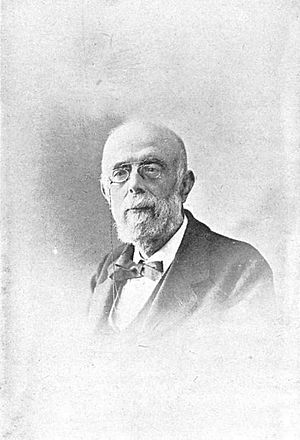Francisco Codera y Zaidín facts for kids
Quick facts for kids
Francisco Codera
|
|
|---|---|

Codera Zaidin, c. 1904
|
|
| Born |
Francisco Codera y Zaidín
23 June 1836 Huesca, Spain
|
| Died | 6 November 1917 (aged 81) Huesca, Spain
|
| Academic work | |
| Notable works | Biblioteca arabigohispana, Estudios de historia arábigo-española, Decadencia y Desaparición de los Almorávides en España, etc. |
| Seat h of the Real Academia Española | |
| In office 15 May 1910 – 6 November 1917 |
|
| Preceded by | Manuel del Palacio |
| Succeeded by | Carlos Cortezo |
Francisco Codera y Zaidín (born June 23, 1836, in Huesca, Spain – died November 6, 1917) was a very important Spanish historian, philologist (someone who studies languages), and Arabist scholar. An Arabist is a person who studies the Arabic language and Arab culture.
Many of his students became famous Arabists themselves. They were sometimes called the Beni Codera. Two of his well-known students were Rafael Altamira and José Deleito.
Francisco Codera's Life Story
Francisco Codera Zaidín was a professor at different universities in Spain. He taught Greek in Granada. Later, he taught Hebrew in Zaragoza. Finally, he taught Arabic at the Central University in Madrid.
He was a top student of Pascual Gayangos, who was also a famous Arabist. Francisco Codera took over his teacher's position as the Arabic professor at the Central University. He became a permanent member of the Real Academia de la Historia (Royal Academy of History) in 1879. From 1910, he was also a language expert at the Royal Spanish Academy.
What Did Francisco Codera Study?
Francisco Codera was very precise in his studies, focusing on facts and evidence. His work mainly looked at historical information from Arab sources. He wrote important books like Estudios de historia arábigo-española (Studies of Arab-Spanish History). Another key work was Decadencia y Desaparición de los Almorávides en España (Decline and Disappearance of the Almoravids in Spain), published in 1899.
He also wrote Tratado de numismática arabigoespañola (Treaty of Arabo-Spanish Numismatics) in 1879. Numismatics is the study of coins and currency. His Estudios críticos de Historia árabe española (Critical Studies of Spanish Arab History) came out in 1917.
His most famous work is the huge Biblioteca arabigohispana (Arab-Hispanic Library), which was published in 10 volumes between 1882 and 1895. He also helped improve the study of Arabic in Spain. He even studied the sounds of the Aragonese language.
After his teaching career, he moved back to his hometown of Fonz, in the province of Huesca. There, he continued his research and wrote books about agriculture. His student Julián Ribera also became a well-known scholar. Today, his old papers and documents are kept at the library of the Universidad Nacional de Educación a Distancia (UNED).
See also
 In Spanish: Francisco Codera para niños
In Spanish: Francisco Codera para niños
 | James Van Der Zee |
 | Alma Thomas |
 | Ellis Wilson |
 | Margaret Taylor-Burroughs |

